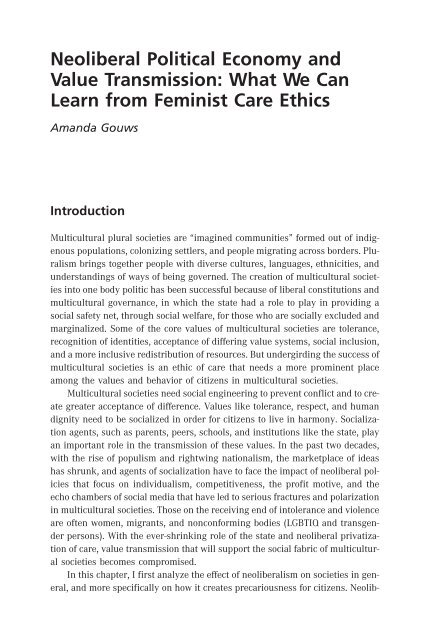Piet Naudé | Michael Welker | John Witte, Jr. (Eds.): The Impact of Political Economy (Leseprobe)
In our late modern pluralistic societies, there are tensions and complementarities between a plurality of individual and social claims and activities to shape societal life and a constructive pluralism of what is known as social systems. The latter provide normative codes and powers emanating from the areas of law, religion, the family, the market, the media, education, academic research, health care, defense and politics. A better understanding and steering of this complex division of powers is crucial for the common good and for freedom and peace. In this volume, a multi-disciplinary team of experts from Germany, Italy, Australia, the UK, the USA, and South Africa bring their conceptual, empirical and historical insights to bear in three broad sections: »The moral dimension of social systems«; »The interaction of religion, law and education with political systems«; and »The moral (mal)-formation evident in case studies on the global financial crisis and social media«.
In our late modern pluralistic societies, there are tensions and complementarities between a plurality of individual and social claims and activities to shape societal life and a constructive pluralism of what is known as social systems. The latter provide normative codes and powers emanating from the areas of law, religion, the family, the market, the media, education, academic research, health care, defense and politics. A better understanding and steering of this complex division of powers is crucial for the common good and for freedom and peace.
In this volume, a multi-disciplinary team of experts from Germany, Italy, Australia, the UK, the USA, and South Africa bring their conceptual, empirical and historical insights to bear in three broad sections: »The moral dimension of social systems«; »The interaction of religion, law and education with political systems«; and »The moral (mal)-formation evident in case studies on the global financial crisis and social media«.
Create successful ePaper yourself
Turn your PDF publications into a flip-book with our unique Google optimized e-Paper software.
Neoliberal <strong>Political</strong> <strong>Economy</strong> and<br />
Value Transmission: What We Can<br />
Learn from Feminist Care Ethics<br />
Amanda Gouws<br />
Introduction<br />
Multicultural plural societies are “imagined communities” formed out <strong>of</strong> indigenous<br />
populations, colonizingsettlers, and peoplemigratingacross borders. Pluralism<br />
brings together people with diverse cultures, languages, ethnicities, and<br />
understandings <strong>of</strong> ways <strong>of</strong> being governed. <strong>The</strong> creation <strong>of</strong> multicultural societies<br />
into one body politic has been successful because <strong>of</strong> liberal constitutions and<br />
multicultural governance, inwhich the state had arole to play in providing a<br />
social safety net, through social welfare, for those who are socially excluded and<br />
marginalized. Some <strong>of</strong> the core values <strong>of</strong> multicultural societies are tolerance,<br />
recognition <strong>of</strong> identities, acceptance <strong>of</strong> differing value systems, social inclusion,<br />
and amore inclusive redistribution <strong>of</strong> resources. But undergirdingthe success <strong>of</strong><br />
multicultural societies is an ethic <strong>of</strong> care that needs amore prominent place<br />
among the values and behavior <strong>of</strong> citizens in multicultural societies.<br />
Multiculturalsocieties need social engineering to prevent conflict and to create<br />
greater acceptance <strong>of</strong> difference. Values like tolerance, respect, and human<br />
dignity need to be socialized in order for citizens to live in harmony. Socialization<br />
agents, such asparents, peers, schools, and institutions like the state, play<br />
an important role in the transmission <strong>of</strong> these values. In the past two decades,<br />
with the rise <strong>of</strong> populism and rightwing nationalism, the marketplace <strong>of</strong> ideas<br />
has shrunk, and agents <strong>of</strong> socialization have to face the impact <strong>of</strong> neoliberal policies<br />
that focus on individualism, competitiveness, the pr<strong>of</strong>it motive, and the<br />
echo chambers <strong>of</strong> social media that haveled to serious fractures and polarization<br />
in multicultural societies. Those on the receiving end <strong>of</strong> intolerance and violence<br />
are <strong>of</strong>ten women, migrants, and nonconforming bodies (LGBTIQ and transgender<br />
persons). With the ever-shrinking role <strong>of</strong> the state and neoliberal privatization<br />
<strong>of</strong> care, value transmission that will support the social fabric <strong>of</strong> multicultural<br />
societies becomes compromised.<br />
In this chapter, Ifirst analyze the effect <strong>of</strong> neoliberalism on societies in general,<br />
and more specifically on how it creates precariousness for citizens. Neolib-
















